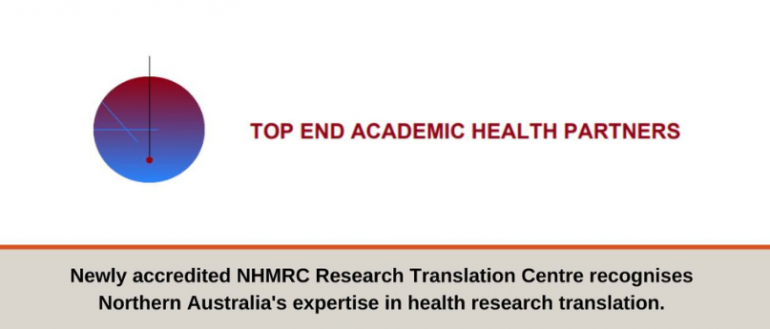Northern Australia’s expertise in translating health and medical research into improved care and health outcomes has been recognised with a recently accredited Research Translation Centre.
Top End Academic Health Partners (Top End Partners) is the newest of 11 centres nationally. There are 4 centres which have a regional, rural, or remote focus and 7 with a metropolitan or state-wide focus.
The Research Translation Centre accreditation by the National Health and Medical Research Council (NHMRC), recognises the partnership as a leader in research translation.
Research Translation Centres are collaborations between health care organisations, research and education institutions and are a key mechanism driving the translation of health and medical research into clinical practice, policy and health systems.
Top End Partners was established by its founding members 10 years ago to be a leader in health care, medical research and education in Northern Australia and across the region. Its goal is to undertake research of the highest quality for the benefit of patients. It consists of 7 organisations from across the region, with Menzies joining with Danila Dilba Health Service, Miwatj Health Aboriginal Corporation Health Service, NT Health, National Critical Care and Trauma Response Centre, Northern Territory Primary Health Network and Charles Darwin University.
Top End Partners extends Australia’s national coverage of health research and translation centres by providing outstanding leadership in research and evidence-based clinical care, benefiting the residents of northern Australia. The partnership’s priority themes include child health and development, tropical health and health security, chronic diseases, and health emergency preparedness, response and trauma care. These themes build on internationally-recognised areas of our leadership in health research and translation.
The Darwin-based partnership has a strong history of prioritising health research activities to support improvements in the health and wellbeing of Aboriginal and Torres Strait Islander people. Top End Partners is also a world leader in infectious diseases which are of critical importance to Northern Australia, disaster and trauma care, and supporting Australia’s response to priority transboundary disease threats of multidrug resistant diseases.
Accreditation recognises Top End Partners’ track record in building the capacity and capability of health services partners to undertake research of direct relevance and benefit to its population, in regional, rural and remote Australia. The partnership has around 6,500 staff and 23,000 students, and it has around 300,000 patient contacts each year.
The recognition by the NHMRC also acknowledges how the partners have been working together effectively to translate research findings into evidence-based healthcare for the benefit of patients and communities. Top End Partners Board Chair and Department of Health Chief Executive, Associate Professor Jo Norton, said the partnership has worked to improve the lives of people across the Top End.
“We have world-class expertise in undertaking translational health research that is underpinned by strong partnerships. This allows us to improve the health and wellbeing of all Territorians,” she said.
A/Prof Norton reported that Top End Partners have facilitated numerous successful research translation projects, including a project to ensure more Aboriginal patients receive culturally safe healthcare in their first language.
“We are already seeing great results from some of our projects. The Communicate Project, which aims to improve Aboriginal patients’ experiences and outcomes of healthcare by addressing communication and safety issues, is a leading example. It has shown that the effective use of Aboriginal interpreters can reduce self-discharge, improve dialysis attendance, empower patients and improves healthcare provider satisfaction” she said.
A/Prof Norton also noted that Top End Partners is at the forefront of addressing the unique geographical and demographic characteristics of the Top End that present major challenges for the delivery of health services.
“The partnership is also a world leader in infectious diseases which are of critical importance to Northern Australia, disaster and trauma care, and supporting Australia’s response to priority transboundary disease threats of multidrug resistant diseases.”
Top End Partners Board member and Danila Dilba Health Services CEO, Mr Rob McPhee, said that the partnership is essential to helping elevate the voices of patients and community members.
“At the centre of the Top End Academic Health Partners are health services, including Aboriginal community-controlled health services, that can inform translational research priorities for research and put outcomes into practice,” he said.
NHMRC CEO, Professor Anne Kelso, said collaboration is at the centre of research translation.
“Translating research outcomes into patient care is critical to improving the health of Australians,” she said.
“These Research Translation Centres bring together the partnerships that make that possible. NHMRC accreditation recognises the strength of these collaborations.”
More information about Top End Health Partners is available online at the Top End Academic Health Partners website.
Further information on the NHMRC Research Translation Centre Initiative is available on NHMRC’s website.

